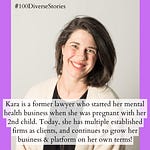About Anshika Arora
Founder of Eternity, a business that is pivoting and fundraising into CRM software to digitally connect & collaborate the wedding planning process, specialising in multicultural weddings
Prior to that, Anshika spent 2.5 years at HSBC Private Banking as a Relationship Manager, before taking the business full-time
Key takeaways and quotes that made us go ‘a-ha’
Focus on problems that are not just obvious to your customers, but also things that they may not know
“87% of couples start google sheet from scratch but don’t know what columns to go into it…actually you don’t actually need to be doing this, there are bigger things you need to focus on”
Transitioning from a part-time founder to full-time can be daunting, but always compare the two, and ask yourself where you’re best spending your time and on what return
“It’s a lot of working in the evenings and on the weekends. The switch really happens when you start switching off from your day job…when you start to compare the two, you start seeing that the business has so much more legs than it did before…so if I didn’t take it full time, I’m not giving it full justice”
“It was more of a gut decision (instead of setting targets) and timing. If you’ve got that gut, do it sooner rather than later”
Data-driven decision making is key. Don’t just look at the overall metrics, get into the weeds and understand the cost / revenue drivers
“Always track your data, it’s great to see the overall numbers, but also get into the detail to understand your customer and supplier habits. It teaches you a lot more”
Customer acquisition is a consistency game - keep going and providing value in a particular way. And eventually people will appreciate the consistency you have and want to explore more
“Finding the first customers was just a lot of consistency…[people have] reached out to us saying I like your brand and consistency, tell me more!”
Generate a community-feel amongst customers, especially since they all face the same problem and could learn from similar inspiration and education
A clear purpose that links you to your business is an important element of building resilience as a founder
“For me, it’s remembering my why and why I do what I do…I think back to the time I faced the problem first hand through my sister. Just the thought that we’re helping peopel plan the happiest week of their life is what makes it super impactful for me”
When you’re hiring, look for people who know how to work in a startup environment. Building a team is beyond just hiring employees, think about hiring a board of advisors as well
“Being a solo-founder, the team is what you are very protective of…[my first employee] comes from having run his own business and he knows how sales ties into operations and marketing, and he knows what it is like to work in a startup”
“We’ve also hired advisors…our first advisor was a tech advisor. As a non-technical founder working on a tech product, it was helpful to have his onboard. He’s the Head of Engineering at another startup”
Personal finance management comes from tracking metrics closely, both revenue and non-revenue metrics can tell a compelling story!
“Track your incomings and outgoings as a business owners…always see your revenue vs non-revenue (e.g. users) figures, that’s really helpful from a financial management perspective…all of it tells a story combined”
Anshika’s advice to women who want to start businesses on their own terms
“As women, we just have a knack for being able to balance a lot of different plates, and the way we think about solutions is a very consumer-driven lens. We take the bigger picture and holistic viewpoint…my biggest advice is to just do it and start it. If you don’t you’ll regret not doing it sooner”













Share this post